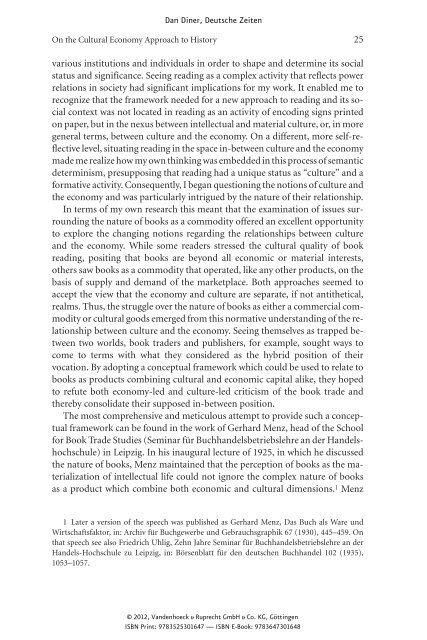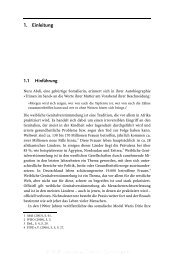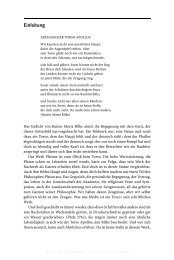und Leseprobe (PDF) - Vandenhoeck & Ruprecht
und Leseprobe (PDF) - Vandenhoeck & Ruprecht
und Leseprobe (PDF) - Vandenhoeck & Ruprecht
Erfolgreiche ePaper selbst erstellen
Machen Sie aus Ihren PDF Publikationen ein blätterbares Flipbook mit unserer einzigartigen Google optimierten e-Paper Software.
Dan Diner, Deutsche Zeiten<br />
On the Cultural Economy Approach to History 25<br />
various institutions and individuals in order to shape and determine its social<br />
status and significance. Seeing reading as a complex activity that reflects power<br />
relations in society had significant implications for my work. It enabled me to<br />
recognize that the framework needed for a new approach to reading and its social<br />
context was not located in reading as an activity of encoding signs printed<br />
on paper, but in the nexus between intellectual and material culture, or, in more<br />
general terms, between culture and the economy. On a different, more self-reflective<br />
level, situating reading in the space in-between culture and the economy<br />
made me realize how my own thinking was embedded in this process of semantic<br />
determinism, presupposing that reading had a unique status as “culture” and a<br />
formative activity. Consequently, I began questioning the notions of culture and<br />
the economy and was particularly intrigued by the nature of their relationship.<br />
In terms of my own research this meant that the examination of issues surro<strong>und</strong>ing<br />
the nature of books as a commodity offered an excellent opportunity<br />
to explore the changing notions regarding the relationships between culture<br />
and the economy. While some readers stressed the cultural quality of book<br />
reading, positing that books are beyond all economic or material interests,<br />
others saw books as a commodity that operated, like any other products, on the<br />
basis of supply and demand of the marketplace. Both approaches seemed to<br />
accept the view that the economy and culture are separate, if not antithetical,<br />
realms. Thus, the struggle over the nature of books as either a commercial commodity<br />
or cultural goods emerged from this normative <strong>und</strong>erstanding of the relationship<br />
between culture and the economy. Seeing themselves as trapped between<br />
two worlds, book traders and publishers, for example, sought ways to<br />
come to terms with what they considered as the hybrid position of their<br />
vocation. By adopting a conceptual framework which could be used to relate to<br />
books as products combining cultural and economic capital alike, they hoped<br />
to refute both economy-led and culture-led criticism of the book trade and<br />
thereby consolidate their supposed in-between position.<br />
The most comprehensive and meticulous attempt to provide such a conceptual<br />
framework can be fo<strong>und</strong> in the work of Gerhard Menz, head of the School<br />
for Book Trade Studies (Seminar für Buchhandelsbetriebslehre an der Handelshochschule)<br />
in Leipzig. In his inaugural lecture of 1925, in which he discussed<br />
the nature of books, Menz maintained that the perception of books as the materialization<br />
of intellectual life could not ignore the complex nature of books<br />
as a product which combine both economic and cultural dimensions. 1 Menz<br />
1 Later a version of the speech was published as Gerhard Menz, Das Buch als Ware <strong>und</strong><br />
Wirtschaftsfaktor, in: Archiv für Buchgewerbe <strong>und</strong> Gebrauchsgraphik 67 (1930), 445–459. On<br />
that speech see also Friedrich Uhlig, Zehn Jahre Seminar für Buchhandelsbetriebslehre an der<br />
Handels-Hochschule zu Leipzig, in: Börsenblatt für den deutschen Buchhandel 102 (1935),<br />
1053–1057.<br />
© 2012, <strong>Vandenhoeck</strong> & <strong>Ruprecht</strong> GmbH & Co. KG, Göttingen<br />
ISBN Print: 9783525301647 — ISBN E-Book: 9783647301648

















